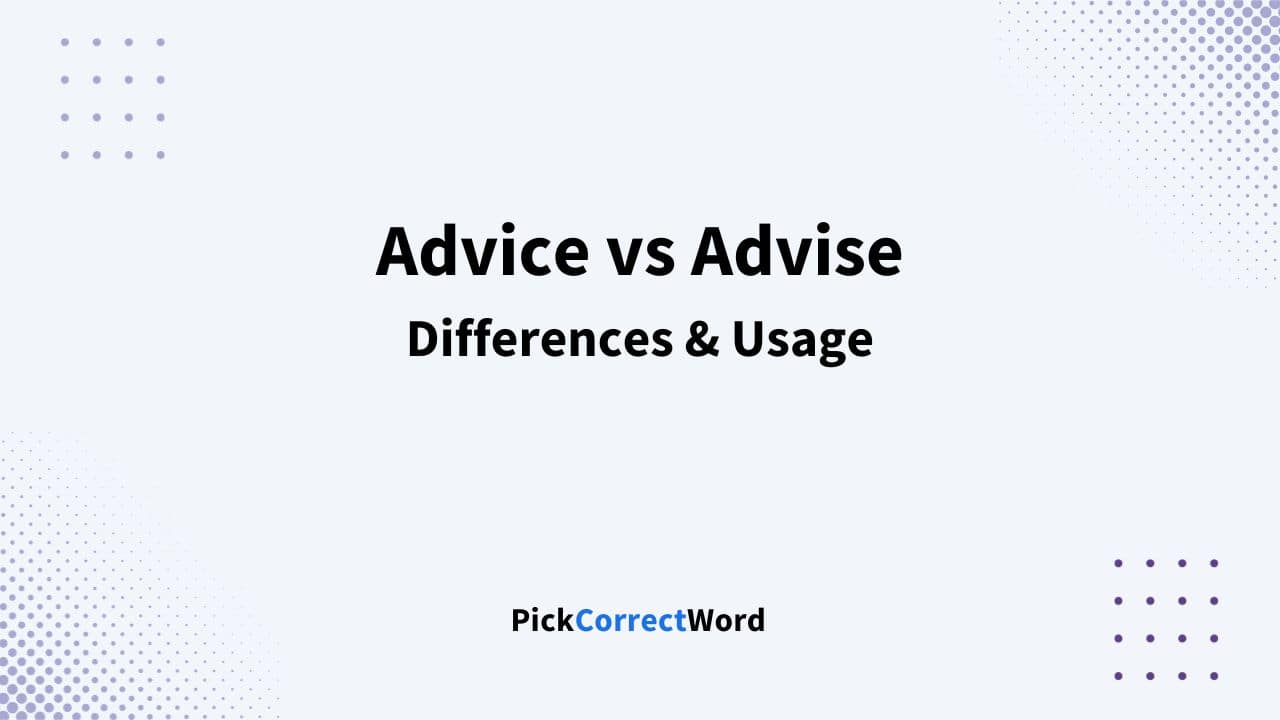It is important to know the difference between “advice vs. advise” if you want to communicate your ideas clearly and correctly in English.
“Advice” is a noun that means a suggestion or recommendation about what someone should do. Its meaning is the same as the guidance itself.
“Advise” is a verb that means to give someone advice or officially tell them about something.
As these words differ by just one letter and have closely related meanings, it can be easy to confuse them, especially since their pronunciation also varies.
Advice vs. Advise: Meaning and Differences
The meaning and difference between “advice” and “advise” depends on how those words are used in everyday speech. These words, which are frequently confused because they have a similar appearance and meaning, differ significantly in grammar and usage.
Definitions and Parts of Speech
- Part of Speech: Noun
- Definition: Suggestions or recommendations concerning prudent future action.
- Part of Speech: Verb
- Definition: To offer suggestions for prudent action or to give information to someone.
Pronunciation and Spelling
The pronunciation of “advise” features a voiced ‘z’ sound, as in /ədˈvaɪz/, whereas “advice” has an unvoiced ‘s’ sound, pronounced /ədˈvaɪs/. Spelling, therefore, is a simple yet crucial cue for proper usage; “advise” with an “s” is a verb, while “advice” with a “c” is a noun.
Countable Versus Uncountable Nouns
“Advice” is classified as an uncountable noun, sometimes referred to more technically as a mass noun. This means it doesn’t have a plural form and it can’t be used with “a” or “an” or a number, signifying it can’t be counted.
For example, one would not say “an advice” or “advices,” but “some advice” or “a piece of advice.” The word “advise” being a verb is not countable or uncountable.
The Correct Use of Advise
“Advise” is a verb in English that means to give advice or suggestions. The right way to use it is very important for giving clear and reliable recommendations.
Using Advise in Sentences
Advise is often used to present advice in a formal context. The structure of the sentence usually follows the pattern: subject + advise + person + infinitive form of another verb.
For example, “The doctor advises her patients to quit smoking.” When crafting a sentence, it is important to ensure that the verb matches with the subject in terms of number and person.
The Correct Use of Advice
In English grammar, “advice” functions exclusively as a noun, most commonly found in the exchange of suggestions or recommendations. It is integral to understand its proper use within communication, as it can impact the clarity and effectiveness of one’s message.
Giving and Receiving Advice
When someone gives advice, they are pointing them in the right direction or suggesting specific things they can do to fix a problem or make things better.
For example, a financial advisor might give investors advice on how to make investments based on their observations, analytics, and knowledge.
Advice doesn’t have a physical form, but it’s often thought of as something that is given or received in the form of “pieces of advice” or “a piece of advice” if it’s a single item.
Common Mistakes and Confusions
Another common mistake is mixing up “advice” and “advise,” with “advise” being a verb that means to give advice or information.
Remember, “advice” carries a sound similar to “ice,” whereas “advise” resonates with “wise,” featuring a vocalized “z.”
Confusion may arise from their similar spelling and related meanings, yet the distinction is primarily their grammatical function: “advice” is what you give when you advise somebody.
Examples of using Advice in sentences
“She gave me great advice on my project.”
“Take my advice and wear a coat—it’s cold outside.”
“He asked for advice on buying a new car.”
“Her advice helped me solve the problem.”
“I need your advice on which job to choose.”
“They followed the teacher’s advice and studied harder.”
Examples of using Advise in sentences
“I would advise you to check the weather before you go hiking.”
“The doctor will advise you on how to take your medication.”
“Can you advise me on which phone to buy?”
“She advised him against making a hasty decision.”
“The teacher advised the students to study for the upcoming exam.”
“They advise that you arrive at the airport two hours early.”
Frequently Asked Questions
How is ‘advice’ used in a sentence?
When someone offers a recommendation, they are giving ‘advice.’ For example, “Her financial planner offered sound advice on investing for retirement.”
What is the correct way to use ‘advise’?
Advise’ should be used as an action word meaning to suggest or recommend. For instance, “The doctor advised her patient to eat more vegetables for better health.”
Is it correct to say ‘Please advise’ or ‘Please advice’?
The correct expression is “Please advise.” This is a polite request for guidance or an opinion.
How do you pronounce ‘advice’ versus ‘advise‘?
The word ‘advice’ is pronounced with a soft ‘c’ sound (like “ice”), whereas ‘advise’ is pronounced with a ‘z’ sound (like “size”).


